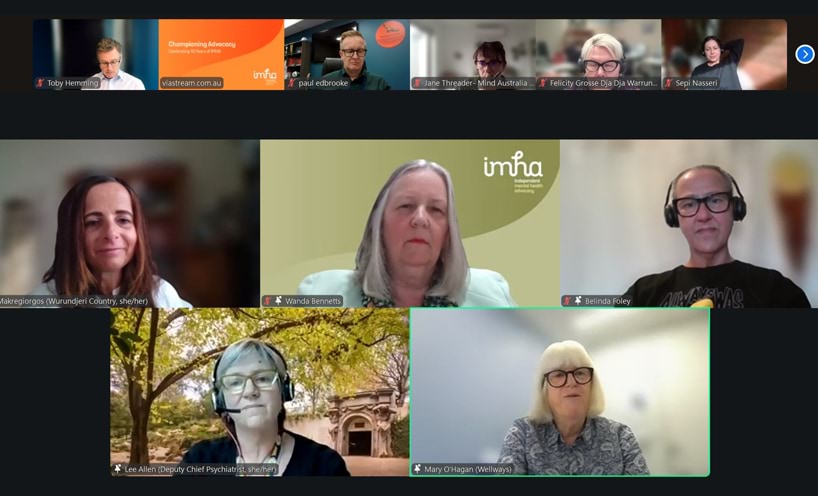- Published:
- Monday 29 September 2025 at 10:14 am
IMHA is one of the few mental health agencies around Victoria that consumers have widespread faith in, and it’s one of the bright spots in a system where progress on reform has struggled.’ – Lived experience expert Mary O’Hagan
This year we celebrated 10 years of Independent Mental Health Advocacy and its support for people receiving, or at risk of receiving, compulsory mental health treatment.
We marked the milestone with an online event, attended by more than 150 colleagues from the mental health, legal and community sectors.
It was opened by Parliamentary Secretary for Mental Health and Suicide Prevention Paul Edbrooke.
The Parliamentary Secretary acknowledged IMHA’s important role, both in supporting consumers directly and in identifying systemic issues. He said IMHA had become a ‘cornerstone of our (mental health) system’.
‘Ten years is an important milestone.
‘Through this work, you’ve ensured people know their rights, can voice their preferences, and are treated, most importantly, with dignity and respect. That’s not just a service, that’s a safeguard – just like other consumers expect in other industries and areas.
‘It’s also a reminder that when people are given the tools to speak up, we know that their recovery is stronger, and our system is fairer.’
Reflecting on a decade of progress
A key highlight of the past decade was IMHA becoming an opt-out service in 2023 – a recommendation of the Royal Commission into Victoria’s Mental Health System and implemented through the Mental Health and Wellbeing Act 2022 (Vic).
Under the opt-out model, every person receiving compulsory treatment in Victoria is automatically connected to IMHA and offered advocacy support so they can have as much say as possible about their assessment, treatment and recovery.
The change tripled the number of services IMHA provides.
From September 2023 to August 2024, IMHA delivered more than 100,000 services, including nearly 48,000 intensive advocacy supports and over 54,000 occasions of information and referral.
‘This highlights the scale of need, but also the importance of having advocacy automatically available,’ Victoria Legal Aid CEO Toby Hemming said.
‘For many people, this has been the first time they were able to understand their rights and be supported in making decisions about their care.’
Lived experience expert Mary O’Hagan called the move to opt-out a ‘real game-changer’.
Other significant reforms included the increased commitment to supported decision making and lived experience expertise, as well as additional resourcing and advocacy on behalf of First Nations consumers, she said.
Belinda Foley, IMHA’s First Nations Manager, leads a team working across our Melbourne (on Wurundjeri Country), Shepparton (Yorta Yorta) and Geelong (Wadawurrung) offices providing services across the state.
Two years since the creation of a specific First Nations team within IMHA, she said they had worked hard to build strong relationships with key stakeholders, like the Victorian Aboriginal Legal Service, Aboriginal Community Controlled Health Organisations, Aboriginal Community Controlled Organisations and Aboriginal hospital liaison officers.
‘With these mighty teams, we’ve been able to make changes for First Nations consumers to allow for their voices to be heard louder,’ Belinda said.
‘This includes adding a cultural aspect to the Advance statement of preferences form, and adding greater knowledge to mob about who we are by going into the communities, rather than waiting for them to come to us.’
Looking ahead to the next decade of reform
Our panellists agreed there was still much work to be done to achieve the reform goals of the royal commission.
‘We’ve got a long way to go still to improve the mental health system within Victoria … (but) this last decade has been one of more effective challenging (of the governance and hierarchies of systems), which is a really positive thing,’ said Deputy Chief Psychiatrist Lee Allen.
It was important that the cultural shift continued to lead to meaningful changes on the ground for consumers.
‘In addition to that really important grounded work that you’re doing, you’re a glue in the sector with sharing strong relationships and maintaining those strong relationships through OCP (Office of the Chief Psychiatrist), through Safer Care and the Chief Nurse, with the peaks, with the Department of Health, these are really important things … which brings the broader system perspective that’s really important,’ she said.
Our report into the first year of the opt-out model shows gaps remain, including:
- delays in receiving notifications of compulsory treatment, limiting our ability to support people in real time
- the inconsistent application of the Act’s principles across services
- the Second Psychiatric Opinion Service struggling with demand, impacting consumers’ ability to exercise their rights
- and still too many consumers who don’t know about their rights at all or about IMHA, unless we reach out to them.
‘These realities underline why IMHA’s work is so vital – keeping consumer voices central, ensuring accountability, and pushing for reforms that deliver the change people have called for,’ Toby said.
This work will continue in partnership with people with lived and living experience of compulsory treatment, led by our consumer advisory group Speaking from Experience.
More information
Find out what IMHA support is available
Order or download our free brochures, posters and postcards, select the ‘Mental health and disability’ category
Read about our vision for a reformed mental health system that prioritises rights and recovery
Updated


